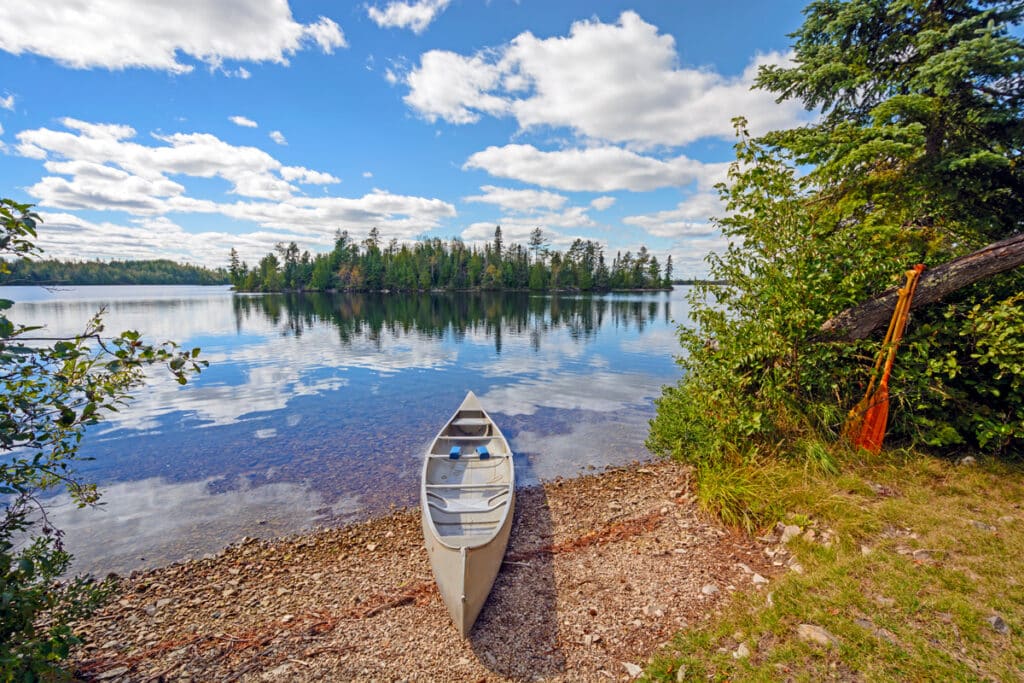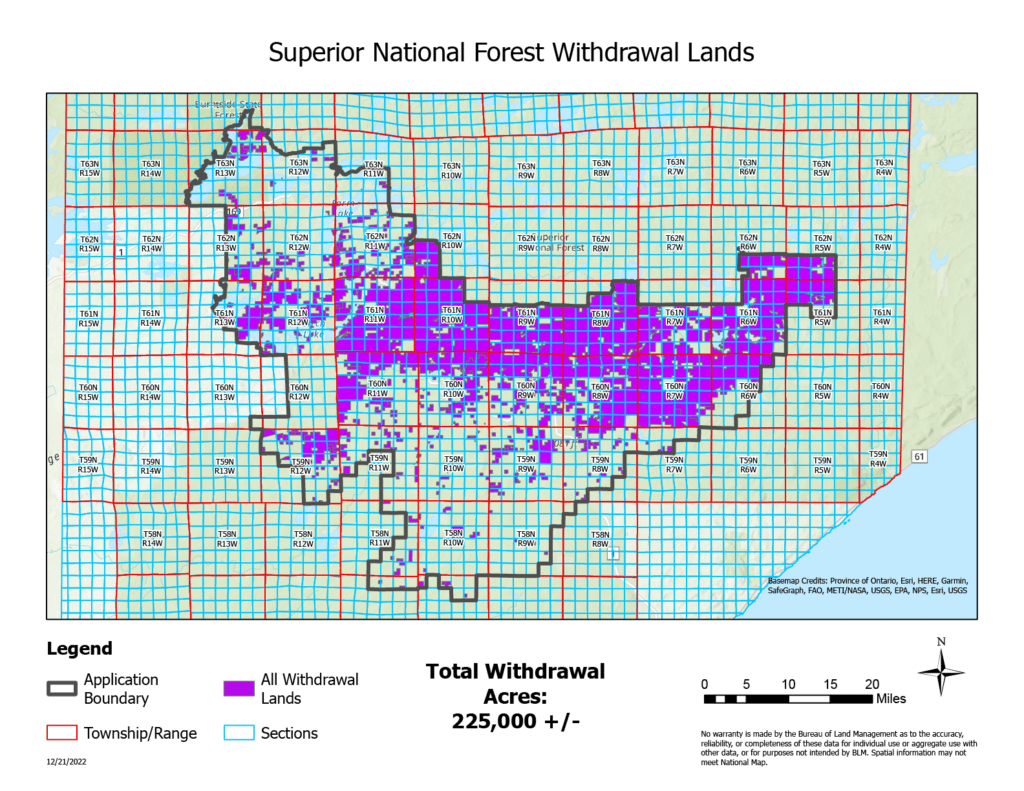
The most popular wilderness in America may be mostly safe from mining pollution for the next two decades. Secretary of the Interior Deb Haaland today signed an order making federal lands upstream of the Boundary Waters Canoe Area Wilderness off-limits to mining until 2043, the maximum length of time allowed by law. The move means the proposed Twin Metals copper-nickel mine and other possible proposals are essentially blocked, unless the withdrawal is somehow reversed.
Withdrawing the lands from availability for mining is the outcome of a long process involving years of advocacy and discussion, numerous public input opportunities, and a two-year study of the risk posed to the wilderness from mining. The withdrawal process was first initiated in 2016, in the final months of the Obama administration, overturned by the Trump administration, and now finalized under President Biden.
Interior Secretary Haaland, the first Native American person to serve in the role, has made protecting the Boundary Waters a priority since taking office.
“The Department of the Interior takes seriously our obligations to steward public lands and waters on behalf of all Americans. Protecting a place like Boundary Waters is key to supporting the health of the watershed and its surrounding wildlife, upholding our Tribal trust and treaty responsibilities, and boosting the local recreation economy,” Haaland said. “With an eye toward protecting this special place for future generations, I have made this decision using the best-available science and extensive public input.”

‘Massive win’
Twin Metals might have been able to move ahead with its mine if it still had active mineral leases in the area. Such leases would be grandfathered in, even under a withdrawal. But the Biden administration also cancelled the leases in January 2022, again reinstating an Obama decision. The leases originated in the 1960s, and had been renewed far past their anticipated lifespan.
Wilderness advocates celebrated the signing as a major milestone in permanently protecting the Boundary Waters.
“Today’s science-based decision is a massive win for Boundary Waters protection,” said Becky Rom, National Chair of the Campaign to Save the Boundary Waters. “You don’t allow America’s most toxic industry next to America’s most popular Wilderness. The Boundary Waters is a paradise of woods and water. It is an ecological marvel, a world-class outdoor destination, and an economic engine for hundreds of businesses and many thousands of people. This decision moves America ever closer to permanently protecting this beloved Wilderness.”
Copper-nickel mining is infamous for creating serious pollution, particularly acid-mine drainage. The metals are found in ore that contain sulfides, which create sulfuric acid when exposed to air and water. The acid can dissolve other minerals in waste rock and escape from piles, mine pits and other sources.
“You don’t let the most polluting industry in America operate next to a pristine wilderness that contains an abundant supply of the cleanest water in the country,” said Friends of the Boundary Waters‘ Executive Director Chris Knopf. “This is common sense, and it’s supported by the rigorous findings of an exhaustive, two-year scientific study.”
‘Short-sighted’
Mining proponents, on the other hand, were outraged. Rep. Pete Stauber, who represent the region in Congress, said was a win for China and a loss for transitioning to low-carbon vehicles and other technology that require precious metals.
“The administration’s decision to withdraw this mineral-rich area — blatantly targeting one of our country’s most promising mines — is short-sighted, foolish and completely unscientific,” Stauber said. “Unfortunately, President Biden doesn’t seem to mind if Minnesota mining communities and the entire American economy pay the price.”
Twin Metals, a subsidiary of Chilean mining conglomerate Antofagasta PLC, released a brief statement saying it is “deeply disappointed and stunned.” The company also hinted it still believes it has grounds to get the leases reinstated.
“We believe our project plays a critical role in addressing all of these priorities, and we remain committed to enforcing Twin Metals’ rights,” the statement concluded.
Last August, Twin Metals sued the federal government to force reinstatement of its mineral leases. It said rejecting renewal was illegal because the government didn’t have the power to do anything but automatically renew them. If the leases are reinstated, Twin Metals could potentially have the right to continue its proposal.
Multiple land managers
While the order only affects federal Forest Service lands, such lands make up a majority of the lands in the wilderness watershed. Additionally, legislation was introduced last week that would prohibit mining on state lands in the watershed. The Interior Secretary is only allowed to remove lands from mining for at most 20 years. Permanent prohibition requires an act of Congress, which Rep. Betty McCollum and others have introduced repeatedly.
The Bureau of Land Management, part of the Department of the Interior, manages the federal government’s mineral rights. The Forest Service, part of the Department of Agriculture, oversees the Superior National Forest and Boundary Waters wilderness, and requested the mineral withdrawal.
“I applaud Secretary Haaland’s decision to protect the long-term health of the Rainy River watershed, including the irreplaceable Boundary Waters Canoe Area Wilderness,” said Agriculture Secretary Tom Vilsack. “This landscape is an international resource renowned for its multitude of recreational opportunities and provides millions of visitors with unparalleled wilderness experiences.”
The withdrawal does not mean all copper-nickel mining proposals in Minnesota will be prevented. The PolyMet mine site is not in the Boundary Waters watershed, and thus not affected by the order. Environmental groups have rallied behind state legislation that would require mine proposals to include examples of similar mines that have operated and closed down without causing pollution.
More information:
- Biden-Harris Administration Protects Boundary Waters Area Watershed – U.S. Department of the Interior
- Feds slap 20-year mining ban on land near Boundary Waters – MPR News


